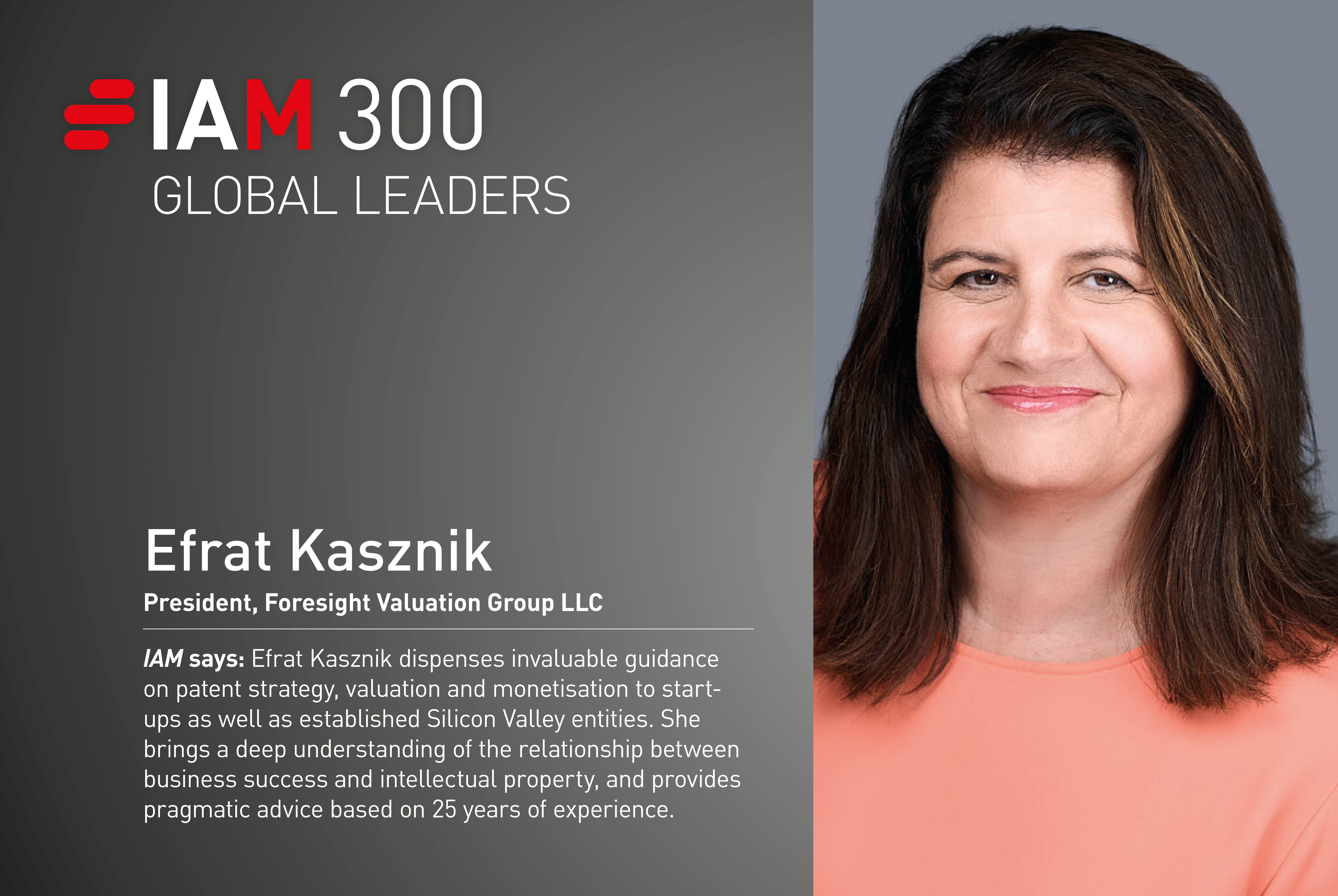Efrat Kasznik
What are some of the biggest obstacles you have had to face in your professional life and how did you overcome them?
I have provided IP valuation services for over 25 years, and have dealt with obstacles that every service provider in a highly technical field has faced: gaining subject-matter expertise and growing a customer base. I came into the IP valuation field with no particular legal expertise and had to quickly get up to speed with the nature of the assets that I was valuing, so that I could competently conduct an IP valuation. For me, creating a consulting business involved customer acquisition through networking and thought leadership. Another challenge, more frequently associated with women, is sustaining a work-life balance. In my case, I have manged to raise two kids while working full time in IP consulting by creating a flexible work environment and doing my best to balance family and work obligations.
IP valuation continues to evolve and become more sophisticated. Do you think there is now enough certainty in pricing intangible assets to give confidence to financial players outside the IP space?
There will never be certainty in pricing for intangible assets without an active market or deal transparency. Regardless of valuation, there is still a basic lack of comparable pricing data points, as IP transactions are not always fully reported. In comparison to markets with price transparency, like the real estate market, the IP marketplace is still lightyears away.
While we do see financial players entering the field (primarily litigation funders or insurance providers), I personally do not think that is due to certainty in pricing, but because of these investors’ ability to control risk. This may give these types of players a competitive advantage over other investors, making IP markets attractive for them.
What are some of the pressing challenges that your clients are facing right now – and how are you helping them overcome these?
We often work with start-ups, valuing their IP portfolios for funding, and their main challenge is how to communicate the value of their intellectual property to investors. We help clients overcome this by putting them in the investors’ shoes and addressing their specific business models and investment goals, for example, helping them to understand how equity investors are different from debt investors (lenders) in how they value intellectual property.
Another challenge that our clients encounter is how to value data and other digital assets. These types of assets account for a growing portion of a company’s value, and yet they are not well understood from a valuation standpoint. Data assets need to be valued separately from other intangible assets using unique and evolving methodologies, which rely on the business models associated with them.
How are you seeing rapid developments in AI impact the IP ecosystem?
I see the development of AI affecting the IP ecosystem in two areas: software tools and legal challenges.
Patent analytics tools have been around for over 25 years, relying on big data analyses. With AI and generative language tools, there are tasks that can now be handled much more efficiently, such as patent drafting and prior art searches. Further, AI has created new legal challenges around inventorship and ownership rights for inventions and creations. With the proliferation of data sets, we are seeing a new and valuable asset class that is subject only to trade secret protection. These challenges have direct valuation implications, as ownership affords economic benefits and control over monetisation.
What, for you, are the hallmarks for a stellar IP commercialisation strategy?
The success of an IP commercialisation strategy depends on leveraging the right asset for the right industry at the right time. While seemingly simple, if implemented correctly this rule of thumb will lead to commercialisation success. Patents are important in life-sciences companies from day one, but they are less so for software companies, at least until later in their lifecycle. Therefore, a patent licensing strategy for a biotech start-up can be very successful, while a patent licensing strategy for a software company will only work if there is infringement later in the company’s lifespan. Brands are important in consumer-facing products much more so than they are in business-to-business transactions. Taking the mobile market as an example, leveraging branding to charge premium pricing for a mobile device sold to consumers will be much more effective than leveraging branding for a supplier selling components to an OEM.
Efrat Kasznik
President
[email protected]
Efrat Kasznik is president of Foresight Valuation Group, a Silicon Valley-based IP valuation and strategy firm. She is also a lecturer at the Stanford Graduate School of Business, where she teaches MBA and executive education classes. Ms Kasznik has over 25 years’ experience providing IP valuation services in support of licensing deals, technology acquisitions, M&A transactions and fundraising. She frequently serves as an expert in legal disputes involving IP and startup valuations and damages.
